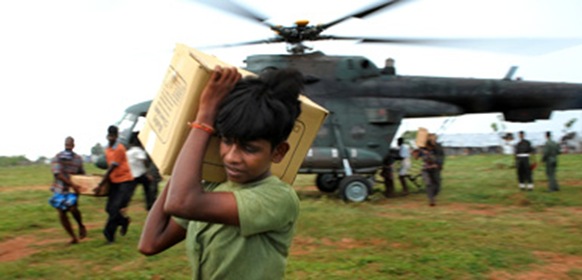
by Jeremy Page
The Sri Lankan Government is trying to siphon off millions of pounds of humanitarian aid by imposing a 0.9 per cent tax on all funding for aid groups, including the British charities Oxfam and Save the Children Fund, The Times has learnt.
Aid workers said that Burma was the only other country that they could remember imposing such a tax — one of several new measures hampering their efforts to help victims of Sri Lanka’s recent civil war.
The new tax regime was unveiled in 2006 but not enforced immediately. Most agencies did not comply, as they hoped to persuade the Government to change it, according to aid workers. In the past year, however, the Government has grown increasingly hostile towards foreign aid groups and Western donors, accusing many of sympathising with the Tamil Tiger rebels, who were defeated in May.
It has started to insist that local and international non-governmental organisations (NGOs) should pay the 0.9 per cent tax on all their funding — backdated to 2005.
That could amount to several million pounds, as there are at least 89 such international and local organisations in Sri Lanka, mostly helping victims of the 2004 tsunami and the 26-year civil war.
They can apply for remittances if they can prove that funds were spent directly on humanitarian relief, rather than training or staff costs, in areas specifically approved by the Government. However, they are having varying degrees of success, with one international body being forced to pay out $320,000 (£196,000) under the new rules. It is still negotiating its tax bill for 2007-09.
“If it’s non-profit work, it shouldn’t be taxed — there should be incentives to work in particular areas instead,” said Jeevan Thiagarajah, the executive director of the Consortium of Humanitarian Agencies.
The Government says that the tax is designed to crack down on NGOs that abused Sri Lankan law and squandered their funds on their own staff after the tsunami. Aid workers, however, say the new rules do not grant tax exemption for all the work they are doing — and want to do — to help 300,000 Tamil refugees in army-run camps. Some say the tax contravenes the international disaster response guidelines drawn up by the Red Cross in 2007 with the participation of 140 countries, including Sri Lanka.
“This is money on which people have already paid tax in their own countries and which is supposed to be helping people in need,” said one aid worker. “This is a desperate money-making measure by the Government.”
Many aid groups are paying the tax out of central contingency funds because donors did not take it into account and would not allow it to come out of their contributions. Another charity worker said: “This runs contrary to everything that the humanitarian aid community stands for.”
Most aid groups already have to pay tax on imported equipment, such as vehicles, as in many other countries. In 2005, Oxfam was forced to pay more than £600,000 in tax for importing 25 Indian four-wheel-drive vehicles to Sri Lanka for tsunami relief — despite the Government announcing a temporary waiver for aid groups.
This time, Oxfam appears to be less hard hit than other international body, as it complied with the new tax regime from the start.
Its accounts show that its Sri Lanka office received £27.9 million between 2005 and 2009, making it potentially liable for £251,100 in tax, under the new regulations. It has, however, managed to negotiate the bill down to £28,000 for 2005-07 and is still discussing the bill for 2007-09, according to sources.
Save the Children Fund, which has received about £35.6 million in Sri Lanka between 2005 and 2009, was originally asked to pay about £350,000 for 2005-09, according to its accounts. It has negotiated that down to about £20,000 for 2005-07, and is still negotiating the tax bill for 2007-09, sources said.
Others have been less successful in their negotiations, mostly because Sri Lankan authorities said that they did not have the correct paperwork. World Vision, the US-based Christian relief group, has paid $120,000 for 2005-06, and made advance payments of $200,000 for the following three years, according to its accounts.
“There are vast discrepancies between individual agencies,” said Mr Thiagarajah. “There’s quite a few whose tax files are still open.”
•A Tamil Tiger grabbed the gun of a Sri Lankan soldier conducting a search of a boat and shot three troops, killing one, a military spokesman said yesterday. It was the first military fatality since the end of the civil war in May.
The shooting took place as troops were searching a “suspicious” boat in the eastern Batticaloa district. The rebel was wounded by troops who returned fire.
(For updates you can share with your friends, follow TNN on Facebook and Twitter )
